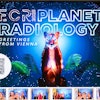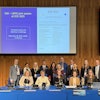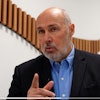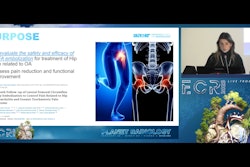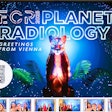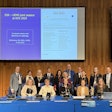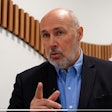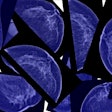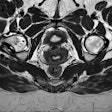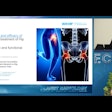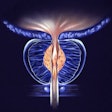Vienna -- From Seneca to Frankl and Kahneman, wisdom literature never gets old. And when technical knowledge reaches its limits, wisdom can fill the gaps. In radiology, few advocate this more than Dr. Paul McCoubrie, who spoke at ECR 2025 on Friday about how radiologists can cultivate wisdom in their daily practice.
McCoubrie, a consultant radiologist at Southmead Hospital in Bristol, U.K., and a regular columnist on AuntMinnieEurope.com argues that philosophical and ethical reflections shape decision-making, interactions, and even resilience -- essential qualities for radiologists.
"The goal is to understand the world better, think clearly, and make better decisions," he said, adding that a wise radiologist influences people not just through knowledge but by understanding themselves and others.
 Showing the way: Dr. Paul McCoubrie. Image courtesy of the ESR and Sebastian Kreuzberger.
Showing the way: Dr. Paul McCoubrie. Image courtesy of the ESR and Sebastian Kreuzberger.
True wisdom takes time, however. "The traditional way to become wise is to see much, study much, and suffer much. This is pain," McCoubrie quipped, adding that by the time people finally attain wisdom, they've already reached what he referred to as "the metallic age" -- "silver in the hair, gold in the teeth, steel in the arteries, and titanium in the hip."
For those unwilling to wait -- or to endure the pain -- McCoubrie gave three shortcuts to appearing wise:
- Look wise. "Wear glasses for intelligence, gray hair for authority, and maintain a thoughtful expression," he noted, adding that age will eventually take care of most of these.
- Act wise. "Wisdom is about staying calm in all circumstances," McCoubrie emphasized. He encouraged radiologists to embody the "calm swan" - graceful on the surface, even when paddling furiously beneath.
- Sound wise. "Say less than is necessary," he advised, citing the Book of Proverbs in the Old Testament: "Even a fool, when he holds his peace, is counted wise." Or "Better to be thought a fool than to open your mouth and remove all doubt."
Avoid vague language in reports, he continued. "Use 'significant' only once a month," he cautioned, earning laughter from the audience. Also, the writing style matters: "Develop a recognizable and readable style so that your report is screaming to be read."
McCoubrie stressed that unlike other doctors, radiologists are judged primarily by their written reports. He outlined what makes a report "wise": Being short, clear, concise, and certain. Minimal hedging, no ambiguity, he advised. Use a consistent, trustworthy style that makes clinicians eager to read your findings.
But the glory of wisdom doesn't last long, he said. Once someone is perceived as wise, staying on the pedestal becomes yet another battle to fight.
McCoubrie warned against losing credibility: "Never retract or explain," he said with a smirk. "Plan your eventual failure by arriving, blaming, and criticizing." However, "don't become a psychopath," he added, listing traits to avoid: arrogance, dishonesty, recklessness, and obsession with money.
"People don't remember exactly what you said or did, but how you made them feel," he noted. To truly become wise, radiologists should learn from role models, balance textbook knowledge with practical experience, and eventually seek feedback -- even when it's painful to do so.
McCoubrie's latest book -- More Rules of Radiology -- is available via its publisher Springer and also local bookstores (ISBN-13 978-3031640933).
